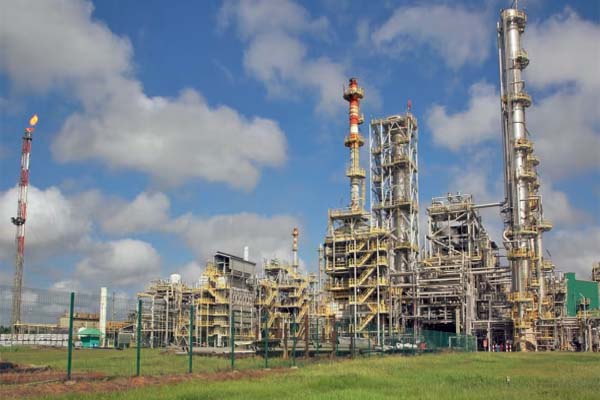
By Michael Stott
Home to a tiny population and a large rainforest, Suriname was famous as one of only three countries in the world that absorb more carbon dioxide from the Earth’s atmosphere than they emit. Now the South American nation is well-known for a different reason.
French oil company Total has discovered nearly 700mn barrels of oil offshore and is evaluating a $9bn investment, which would turn Suriname into a significant oil producer.
Far from lamenting paradise lost, Suriname’s citizens took to social media to rejoice. “You can imagine the mood,” Chan Santokhi, the former Dutch colony’s president, told the Financial Times. “Finally . . . people have hope, there is a bright future for everyone.”
Suriname exemplifies a trend. Latin America may be one of the world’s best regions for producing green energy, thanks to abundant hydro, solar and wind reserves, but is instead fast building up fossil fuel production.
Kingsmill Bond of RMI, a US clean energy non-profit, laments that “people are doing it simply because they have yet to break out of the 20th century mindset of thinking that fossil fuels are the route to riches” — though he concedes that low-cost oil and gas can still make sense.
Suriname’s neighbour Guyana is beginning an offshore oil boom that will make the country of 800,000 a top-20 global oil producer by 2026. Its GDP will expand by 37 per cent this year, the IMF predicts, making it one of the world’s fastest-growing economies.
To the east, Brazil hopes that the same geology that is making Guyana and Suriname rich will deliver wealth in its territorial waters.
Finance minister Fernando Haddad was in New York in September looking for investment in green energy, but state-controlled oil group Petrobras has pledged to invest more than 80 per cent of its $78bn of capital expenditure over five years in oil and gas exploration, and much of the rest in refining.
New fields off the mouth of the Amazon could help Brazil to reach a government target of becoming the world’s fourth-largest oil producer by 2029.
Francisco Monaldi, a Latin America energy expert at Rice University in Houston, pointed out that if oil demand plateaus in the next few years and then declines slowly, as some scenarios indicate, the world will still need Latin America’s oil. Since many projects have lower costs and carbon intensity than the global average, “I don’t see this as a total contradiction,” he said.
Further south, Argentina is expanding shale oil and gas production from its Vaca Muerta deposit in Patagonia, and the International Energy Agency predicts record output of more than 1mn barrels per day in 2028.
Venezuela, with the world’s biggest crude reserves, is reversing years of declining production, thanks to a partial easing of US sanctions. It pumped 747,000 barrels per day in the three months to the end of August, up by a third from two years ago. Washington’s decision in October to lift all sanctions for six months could push Venezuela’s production over 1mn bpd, and perhaps to 1.3mn bpd in a year if the relief is maintained, according to insiders.
Treading a different path is Colombia, Latin America’s third-biggest oil producer. Production there is declining and no big new discoveries have been made.
Rather than encouraging drilling, leftwing president Gustavo Petro has increased oil taxes and banned new exploration contracts to wean the country off fossil fuels. Private oil investment has plunged by a third this year and there is already a natural gas shortage.
The shift away from an industry that provides a third of Colombia’s exports might matter less if Colombia were building up its renewable energy industry quickly. But in May, Italy’s Enel abandoned a big wind farm project in La Guajira after years of protests by local communities.
The debacle illustrates a problem dogging renewable energy projects in Latin America: political risk. It may help explain why this year only half the energy investment in the region is going to renewables, a slightly lower proportion than in 2019.
“Latin America needs much better institutions and regulation to manage renewable energy projects,” said Monaldi. “Oil and gas may be high-risk, but the returns are super high. Oil companies will go and talk to [Venezuelan president Nicolás] Maduro but nobody is going to build a wind farm in Venezuela.”
michael.stott@ft.com
_________________________________________
Michael Stott is the Latin America editor of the Financial Times based in London. He was previously in Tokyo as managing editor of the Nikkei Asian Review, a sister publication covering Asian business and politics. Prior to that he was the FT’s UK news editor. Michael reported from Latin America between 1990-1998, living in Brazil, Colombia and Mexico. Formerly Moscow bureau chief and Editor, Europe, Middle East and Africa at Reuters, he joined the FT in 2014. Michael graduated from Cambridge University with an MA in Modern Languages and speaks fluent Spanish, Portuguese, French, German and Russian. Energiesnet.com does not necessarily share these views.
Editor’s Note: This article was originally on the Financial Time (FT) on the November 14, 2023. All comments posted and published on EnergiesNet or Petroleumworld, do not reflect either for or against the opinion expressed in the comment as an endorsement of EnergiesNet or Petroleumworld.
Use Notice: This site contains copyrighted material the use of which has not always been specifically authorized by the copyright owner. We are making such material available in our efforts to advance understanding of issues of environmental and humanitarian significance. We believe this constitutes a ‘fair use’ of any such copyrighted material as provided for in section 107 of the US Copyright Law. In accordance with Title 17 U.S.C. Section 107. For more information go to: http://www.law.cornell.edu/uscode/17/107.shtml.
EnergiesNet.com 11 14 2023












